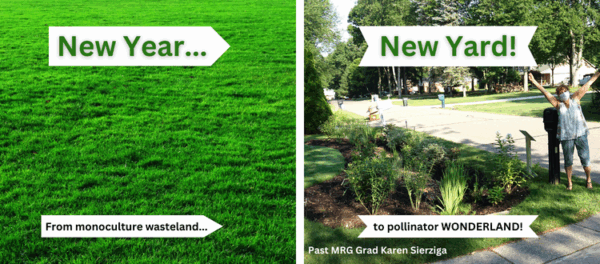Have you ever thought about making some resolutions for your yard? Here are New Year’s Resolutions you can make to keep your Rouge River healthy! For best results, choose at least one resolution.
Pledge to choose healthier lawn and landscape products in 2023!
- Replace synthetic fertilizer or “weed & feed” products with organic.
Synthetic fertilizers are water-soluble. Your plant absorbs some of it, but much is washed away with irrigation or rain. You guessed it! It ends up in our Rouge River. These salt-based fertilizers harm the delicate balance of habitat for the native residents in our soil, as well as our waterways.
Organic fertilizers are made with ingredients found in nature. They are mostly microbe-soluble. These fertilizers are naturally slow-release, providing nutrients in a form your plants will recognize and absorb – improving soil quality and protecting the life in our yard and in our waterways. They are also effective at greening our lawn and easy-to-use in granular form.
- Avoid pesticides.
Here’s a fun fact: only 2% of the world’s insects are pests! Very often, we use pesticides when we don’t really need to. For example, to control aphids, you can give a strong blast of water every 3-5 days to keep them under control – until the ladybugs show up to take over!
Especially avoid neonicotinoid pesticides that have been implicated in the die-off of bees. Look out for these active ingredients on the label and avoid them. (These are all neonicotinoids): imidacloprid, acetamiprid, dinotefuran, clothianidin, and thiamethoxam.
- Commit to planting at least 3 (more) native plants in 2023.
Check out what we have in our Store for Spring pickup!
- Native trees, shrubs, flowers, grasses, and sedges provide habitat. They also have deep or extensive roots. Compared to lawn, these roots absorb much more rainwater – and faster! – so they reduce the amount of runoff going into our overburdened wastewater system. Also, native plants, once established, generally need much less care, less fertilizer, and less pesticide than lawn.
- For maximum benefit, replace a portion of lawn with a new native planting area. A new native tree and shrub bed, a butterfly garden, or a rain garden means less mowing, less pollution, more beauty for you, and more rainwater catchment and habitat for a healthy Rouge River.
- Include some native milkweed or other plants for the butterflies, bees, and other pollinators. Consider these beauties:
- Swamp Milkweed – Asclepias incarnata (wet to medium wet areas in full or partial sun)
- Butterfly Weed – Asclepias tuberosa (dry areas in full sun)
- Black-Eyed Susan – Rudbeckia hirta or fulgita (medium to dry areas in full sun)
- Consider taking an upcoming class to learn everything you need to build your own rain garden! Master Rain Gardener virtual classes begin in February, or in-person classes begin in April, register now!
- Native trees, shrubs, flowers, grasses, and sedges provide habitat. They also have deep or extensive roots. Compared to lawn, these roots absorb much more rainwater – and faster! – so they reduce the amount of runoff going into our overburdened wastewater system. Also, native plants, once established, generally need much less care, less fertilizer, and less pesticide than lawn.
By choosing one or more of these resolutions, you can feel good that the changes you make in your yard are benefitting your Rouge River and all its inhabitants – including you, your neighbors and your community!
Categories
-
 BlogRead the latest blog posts from your FOTR team.
BlogRead the latest blog posts from your FOTR team. -
News & EventsLearn more about upcoming FOTR events and projects
